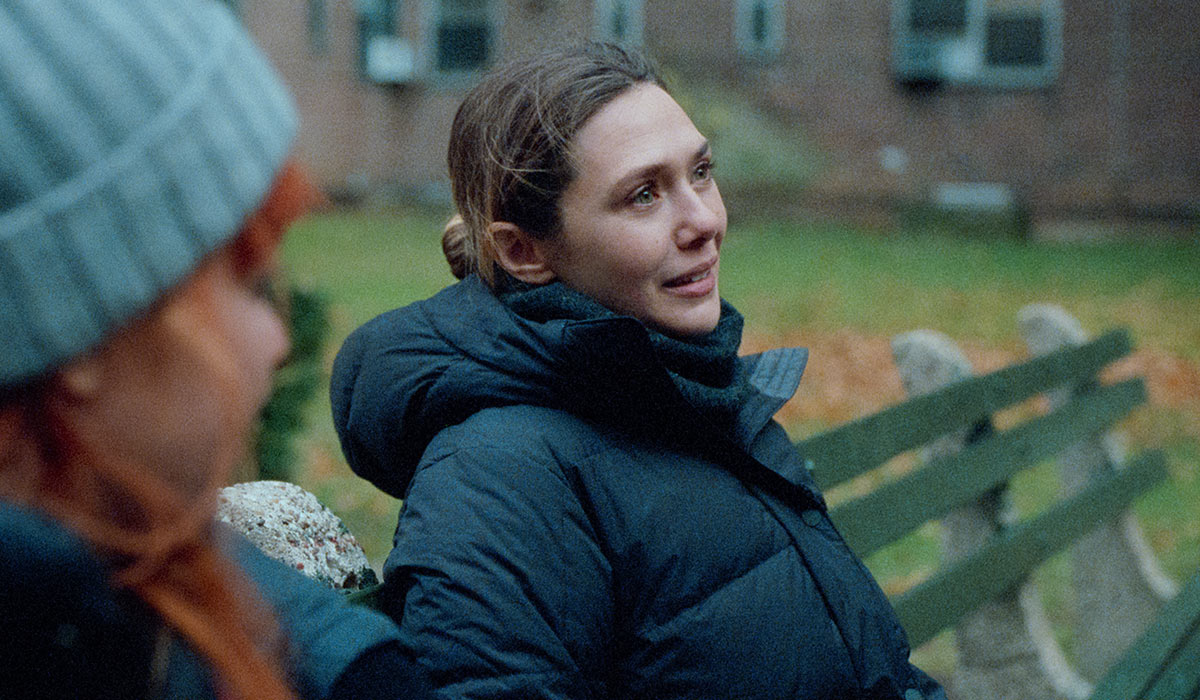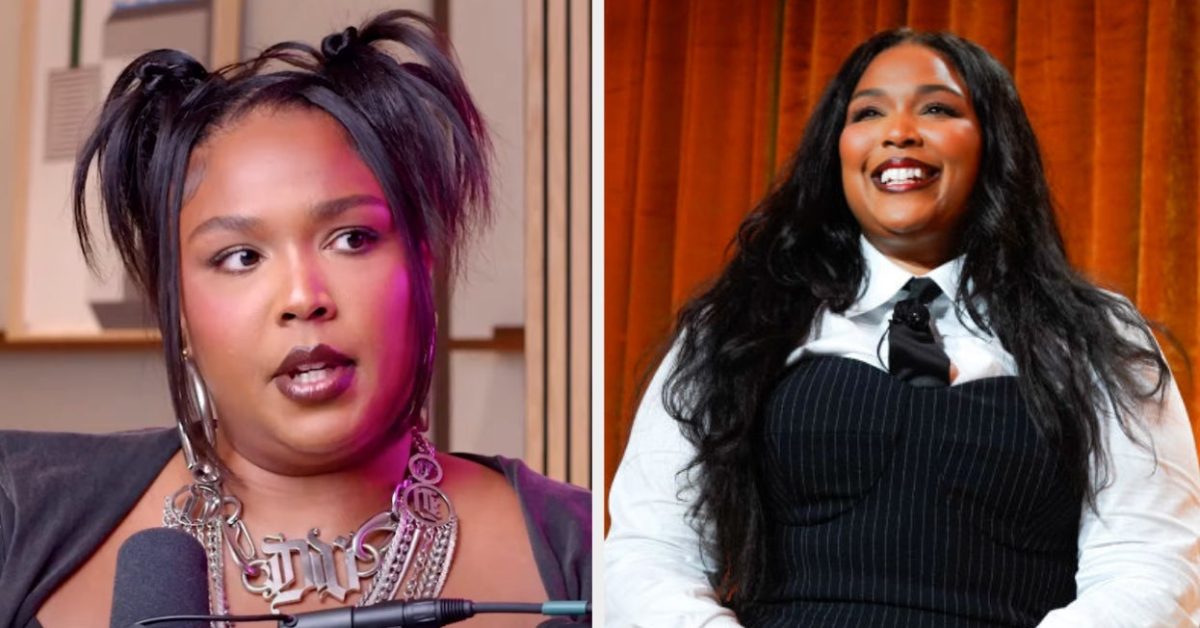
Elizabeth Olsen Digs Deep For A Career Best In ‘His Three Daughters’ [Interview]
Sep 25, 2024
As a fan of “His Three Daughters” even before its 2023 Toronto International Film Festival debut, it’s been a long wait for the rest of the world to finally see it. Not only has Azazel Jacobs‘ sublime drama ended up as one of the most acclaimed films released in 2024, but it had a very strong debut on Netflix this past weekend, landing at no. 5 on the streamer’s movie top 10 list in less than a week of views. And, as expected, awards buzz is growing for the film’s impeccable trio, Carrie Coon, Natasha Lyonne, and Elizabeth Olsen. We caught up with Olsen, who arguably gives one of the best performances of her career, late last month.
READ MORE: Carrie Coon fails to convince u she could have been better in ‘His Three Daughters’ [Interview]
Set mostly in a Manhattan apartment tower, Jacobs’ fictional tale follows Katie (Coon), Christina (Olsen), and Rachel (Lyonne) as they reunite in their childhood home as their father enters the final stages of hospice. As the days grow longer, long stewing resentments between the three sisters start to rise to the surface. At one point, Christina, who up until that moment has been the de facto peacemaker among the trio, finally loses her patience with Katie. She finds herself sitting in a chair, attempting to calm herself before Katie finds her. The scene could have been played a number of different ways and Olsen says she discussed it in depth with Jacobs.
“I assumed I was going to be in a closet door, sitting in a chair or something,” Olsen recalls. “I was trying to understand the dynamic of what that looked like. Everyone thinking that something was wrong with her. Throughout the film, her coping mechanism for dealing with any of this is to find her own space. She so isn’t allowed to take up space in this family, and she retreats into herself through habit. The only way she can take up space is by putting down a yoga mat and trying to stretch in a corner or finding a chair to just sit and be alone and hide. But there’s nowhere for her to hide. So, she’s hiding in plain sight, which in itself becomes this comedic moment. But that was the intention of, ‘How do I find space when there’s no space?’ It was funny tonally. You’re like, ‘Aza, we’re this far into the movie, is this when we become a screwball comedy? What’s happening?’”
Of course, the scene can also be interpreted as not funny, which is one of the masterstrokes of Jacobs’ screenplay and direction.
Throughout the rest of our conversation, Olsen reveals the secret nature of Jacobs’ project, how the legendary Diane Wiest influenced her performance, why Christina makes a specific choice at the end of the film, and much more.
This interview has been edited for length and clarity.
____
The Playlist: What was the one thing about the screenplay that made you say, yes, I’m going to do this movie?
Elizabeth Olsen: I think there are so many reasons why I was going to do it. I think primarily my relationship with Aza [Jacobs]. He directed me in two episodes of a show I did called “Sorry For Your Loss,” and we continued a friendship through those two different seasons. And then after, and he and I have had other projects that we’ve thought about developing, and then he just said that he wrote this really quickly, and he had never felt so clear about a story and these characters in this world that at this point in his career. And so he shared it with me saying, “I’m going to hand deliver you this script, and I’m going to also do the same for Carrie Coon and Natasha Lyonne, but I don’t want to send it on an email, but I will share it with your team or whatever your agent, your manager, but I will give them their own hard copies.”
Oh, he went around the agent. [Laughs.]
He did, yeah. He mailed it to, I think, their offices, but to Carrie, Natasha, he delivered these hard copies because [he] had this dream of returning to a form of, when he started filming when he did “Momma’s Man.” And this idea of being able to make a film truly independently without prior sales like shopping something around and making some big announcement about something. He didn’t want anyone to know that this project existed until it was screened somewhere. Until it was an actual object that he could put out in the world. And so there were so many reasons to say “yes” beyond just even cracking the page open. It was kind of like this experiment, regardless of what it would be if Carrie, Natasha, and I and our schedules could find three weeks where we could do this. That felt like an absurd dream that just happened, and it worked out.
And I think from also the first page and then the second page, you’re kind of blown away by the confidence of having these characters speak for a page and a half with no interruption. And it says in the screenplay that we are not cutting away. We don’t know who she’s speaking to. We don’t really know even the context of the space. And there is such a confidence in that kind of storytelling, and there’s so much language. And then there are these relationships that unravel as we go. And so there are so many reasons to say yes to this project, and it really feels like this strange little film miracle that it actually came to be and worked and [was] outside the system.
I just watched it again and it feels like a very personal story for him. Was this inspired by events from his own life?
No, they were women who he just created, and they’re kind of this amalgamation of people in his life. For instance, the idea of someone loving a Deadhead and it kind of being surprising to their character is that I do know that he has a friend who he’s had for 20 or 30 years. His friend goes through a divorce, and he learns that this guy had been throughout the entire 20, 30 years of knowing him was a Deadhead. And Aza knew nothing about that until his divorce. So I think that specifically was something that was taken from a friend of his, but these women were just characters that spoke to him on the page. And I think it came from multiple experiences. And I know for Natasha[‘s character], he had a friend that always, even at dinnertime, would always be gambling and betting. And so there are these elements of people, but they weren’t specific women or an experience that he had. It was just something in his head about how to process this time that he felt was approaching him with how you deal with your parents’ passing and sibling dynamics. But they were these strangers who he knew so well and could answer any question of ours.
Was there anything in particular that your character revealed in the script that told you, “Oh yes, I know who she is”? The one thing that popped personally to me is her entire family lives on the East Coast, but she all the way across the country on the West Coast.
Same. Yeah, I think that was the choice to leave a city experience and go somewhere out West where things slow down, and we try to create this idea of the rhythm and the tempo of the world that she’s leaving. There was that element, but I think just from the opening monologue because really those opening monologues or that opening scene is a presentation in a way of the roles that either we play because we are told to play them by other people in our lives or they’re what is assumed of us. And so, from that assumption, I could only make of Christina that she, instead of using her voice and communicating directly, gets overwhelmed with sensitivity and emotion and potentially has a very quiet, sensitive way about her. That made me think of Diane Weist in “September.” And I kept thinking about Diane Weist, not like this is anything like her character and “Hannah and Her Sisters,” but there’s a softness and a tenor to her voice that’s really specific, and there’s just kind of this lovability quality to her kindness and her vulnerability. And so I wanted to kind of start from there and figure out what that meant. But that was kind of the first seed that I had reading this script.
There’s a moment in the film where Christina has a realization that her sisters do not realize how much of her own personal pain she’s dealing with. They think her life is fantastic and amazing. Do you think that hurts her more than anything else?
Yeah, I do. I think that that scene after the big blowup fight was my favorite to shoot because I felt like there was no real resolve that happens from that scene. There’s more honesty that’s spoken, but it’s [there is no sense of it being] resolved. So to assume that you’re misunderstood by your family is one thing, and then to actually hear how clearly misunderstood you are, I think, is really heartbreaking for someone. And that’s why at the end of it was interesting structurally with this script because generally you have something happens, and then there’s a reaction to it that seems logical or illogical, and then it leads to something else. And with this, with Christina, there’s a lot of ping-ponging backward of nothing seeming too clear in what the journey was going to be for her. But having that experience of feeling so misunderstood almost made her more honest, moving forward and having this sense of confidence and sharing with them who she feels like she actually is at the end by the time they’re on that sofa. But yeah, I loved that scene so much after the fight. I think the other reason I loved it is because it was a moment that Natasha allowed herself to be open to us as Rachel, and in a way that I enjoyed watching and playing off of because even though we had rehearsal time, none of us expected how things evolved as they did in this film. It was a true process and discovery every step of the way. And I think that was another reason why I loved shooting that scene.
Was there time even time for for rehearsal beforehand?
We weren’t doing rehearsals with blocking. I think from a technical standpoint; it was really about getting an understanding of the language and the pacing that Aza so clearly had dictated in the script within stage directions and, dashes and, ellipses, and so on. And so he had a very specific rhythm in his head of how he wanted it to feel. It was very musical. And so that was a big part of the rehearsal. Finding the right sound changes for our natural accents was part of the rehearsal time. And then also just a conversation about the backstory that we all need to be on the same page of logistically of what happened at what ages that led to these dynamics and these relationships and expectations that we have of each other. I think we had four days of that We weren’t blocking through scenes, and within that time, we’re also having fittings and camera tests and testing lenses. And Sam Levy had to shoot everything as well with his film camera so that he could test out those prints along the way. His camera test, because we were shooting on film, was him taking photo stills and understanding how to shoot the light within that space. It was all very analog and a return for all of us in an exciting way, I think, for all of our respective jobs.
And by the way, I should know this, but I don’t remember from the production notes, but was it shot in a real apartment?
Yes.
So that’s not a big apartment.
No. [Laughs].
Was it like three people in the room? Did it feel very small?
It is very small. I think that was a big thing for Aza because he didn’t know exactly what the apartment was. It wasn’t a location he knew of, but he did [scouted a lot of] rent control apartments throughout New York City, specifically downtown on the east side. So, he ended up finding this apartment, which felt a lot of these apartments are terribly modernized and renovated. The really bad version of it. And so you lose a texture of a family having lived there for, let’s say, 40-something years. He wanted there to be a reality of the father’s job and also what it could have been like for these girls growing up on top of each other. And yeah, it was tight quarters. Everything was in that apartment.
Carrie and I had a green room that we shared in an apartment. Natasha had her own and kept us separated in a way, but ultimately, we were all kind of on top of each other by the end of it. And then, the actual production office was in the basement where the laundry machines are in this apartment building. And so it was really scrappy, but every department was distilled down to necessity. And I think it was an amazing challenge for everyone to work in those kinds of tight quarters and how to be so creative within those limitations.
I want to ask about two other specific moments in the film. One is the moment where Christina finally sort of has it with Katie in the kitchen and sits in that chair to try to collect herself. What did you think Christina was reacting to at that point? Did the script say why she does that?
Not really, but I talked about it with Alex a lot. I was like, “Are we doing a screwball comedy moment here?” I assumed I was going to be in a closet door, sitting in a chair or something. I was trying to understand the dynamic of what that looked like. Everyone thinking that something was wrong with her. Throughout the film, her coping mechanism for dealing with any of this is to find her own space. She so isn’t allowed to take up space in this family, and she retreats into herself through habit. The only way she can take up space is by putting down a yoga mat and trying to stretch in a corner or finding a chair to just sit and be alone and hide. But there’s nowhere for her to hide. So, she’s hiding in plain sight, which in itself becomes this comedic moment. But that was the intention of, “How do I find space when there’s no space?” It was funny tonally. You’re like, “Aza, we’re this far into the movie, is this when we become a screwball comedy? What’s happening?”
Also, at the end of the film, after their father has died, they’re sitting on the couch and the only one of the three who gets up and decides to go and sit in his chair is Christina. And why do you think she does that?
There’s this thing that we discovered only because we were filming an order. It wasn’t indicated in the script how we were all supposed to react to the loss or what the outcome of what Aza wanted us to all feel or portray. But it was through the journey of making the movie. I just decided that this is the woman who has been most honest about her father’s passing the whole step of the way she’s spent the most time with him. She’s looking at death every day. She’s reading to him, she’s singing to him, she’s spending time with him. She doesn’t fear entering that room in the same way her sisters avoid it. And so I feel like by the time that happens when he does pass, she has a bit more, not a sense of ease, but she has more of a strength than they do at that moment. And the baby sister becomes the one who’s strongest in that moment. And someone who we thought at the beginning of the film, which maybe was so easy to break because of her vulnerability with her father and being present, she’s actually able to process this in a different way than they are. And so I think that’s why she goes and takes up that space in his chair and finds that connection to him one last time. And then they follow suit, and she kind of becomes the mama bear at the end in that way to them while they’re having their own experiences of heart-open moments for them that we hadn’t seen by that time in the film.
It feels like Rachel and Katie may be able to form sort of a bond as sisters moving forward, but do you feel like Christina will also form that bond? Or do you think she will go back to the West Coast and sort of always be distant?
I think she’ll go back to the West Coast and continue the life that she was proud she created outside it. But there is something that I learned from doing press with my first movie, “Martha Marcy May Marlene,” that kind of ends with no real answers delivered. What I love most about the restrictions in the construct of film is that it begins and ends in a very specific framed space and what happens after. There’s something about answering that question. I remember Sean Durkin saying, “I don’t want to say because I ended it right where I wanted it to.” And so, I’m always kind of hesitant to answer what happens after a film because I do believe that the structure of the piece is framing something that is all we’re supposed to be analyzing.
“His Three Daughters”. is now available on Netflix worldwide
Publisher: Source link
"All Of This Came Out Of Nowhere": Lizzo Publicly Responds To Sexual Harassment Lawsuits After Being Dismissed From A Case
"We're continuing to fight the other claims."View Entire Post › Disclaimer: This story is auto-aggregated by a computer program and has not been created or edited by filmibee.Publisher: Source link
Dec 27, 2024
This Fan-Favorite Elf Quote Almost Didn’t Make It Into the Film
11. Determined to maintain the old school aesthetic, Favreau told Rolling Stone he didn’t want to make the film “a big CGI extravaganza," only using the technology to add some snow. “I like motion-control, models, matte paintings,” he explained. “It…
Dec 27, 2024
Guess The Missing Word: Christmas Song Titles
The holidays are here, and there's no better way to ring it all in than a seasonal song or two. So test your yuletide knowledge by identifying the missing word in the 14 holiday songs below. Good luck! Disclaimer: The…
Dec 26, 2024
Score an Extra 40% off Fashion & More
Our writers and editors independently determine what we cover and recommend. When you buy through our links, E! may earn a commission. Learn more. Even on Christmas Day, Anthropologie has your back with an extra 40% off sale that’s practically a…
Dec 26, 2024











